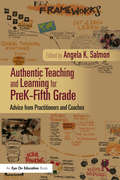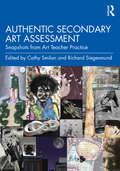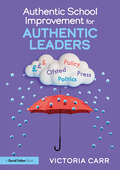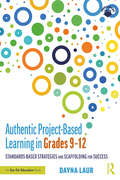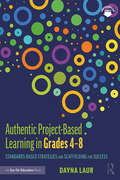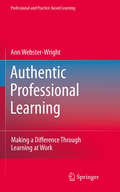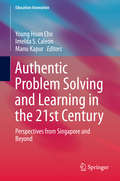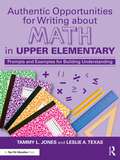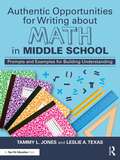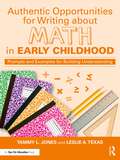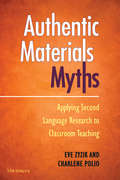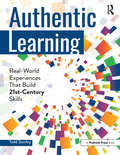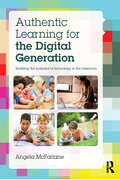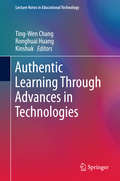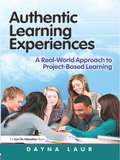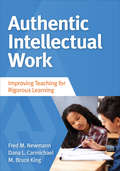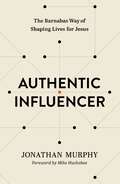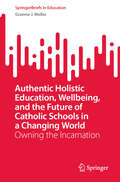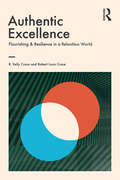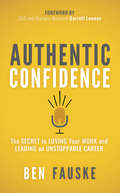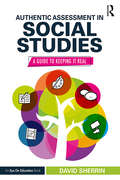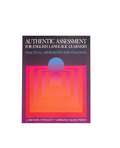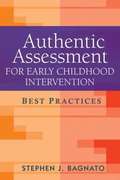- Table View
- List View
Authentic Teaching and Learning for PreK–Fifth Grade: Advice from Practitioners and Coaches
by Angela K. SalmonAuthentic Teaching and Learning for PreK–Fifth Grade provides examples of pedagogical approaches to enhance rich curriculums based around frameworks such as Teaching for Understanding, Making Thinking and Learning Visible, Artful Thinking, and Out of Eden Learn. You will learn about real classrooms that have successfully transformed cutting-edge ideas from these different frameworks into powerful learning experiences. A highly practical resource based on Harvard’s Project Zero ideas, this book shares how research findings have been complemented and implemented in the field, and will teach you how to apply best practices that lead to meaningful and authentic learning experiences in the classroom that promote Habits of Mind.
Authentic Secondary Art Assessment: Snapshots from Art Teacher Practice
by Richard Siegesmund Cathy SmilanOffering a contemporary overview of how visual art teachers assess learning in their classrooms, this book provides an outline of the role of assessment in reporting not only student achievement but also how student assessment ties to the intrinsic and external assessments of teacher performance. Compiled using stories from the classrooms of 19 visual art high school teachers who share their approaches to benchmarking student success, the text encourages teachers to consider assessment both for guiding their students to achieve artistic goals and for re-envisioning their own curriculum and instruction. The featured assessment snapshots fall along four strands: Visual Narratives and Visual Literacy; Capturing Empathic Understandings and Social Engagement; Measuring Risk-taking and Ingenuity; and Assessing Collaborative and Integrated Learning Outcomes. Across these sections, teacher contributors offer different perspectives for student assessment, capturing a snapshot of the work of skilled practitioners and focusing on various aspects of what can be evidenced and analyzed through formative and summative evaluation. The voices of university level art educators are also included to expand the range of context from curriculum and instruction content that is covered in pre-service art methods courses. All sections also conclude with a summary, questions, and discussion points. Including diverse teacher voices as well as presenting assessment perspectives with an eye to the National Core Art Standards (NCAS), this book is ideal for pre-service and in-service secondary art educators, as well as for use in art education teacher certification courses that focus on secondary methods, and art education graduate classes in assessment.
Authentic School Improvement for Authentic Leaders
by Victoria CarrAuthentic School Improvement for Authentic Leaders charts a full improvement journey of a school from a ‘Requires Improvement’ Ofsted rating, through a second, to a resounding ‘Good’. It reveals the impact that a school leader can have on the motivation and engagement of teachers, parents and pupils and how this translates not just to their overall happiness, but on academic standards and systemic, long-lasting school improvement whilst maintaining their own well-being.Bringing together a wide range of accessible and relatable school improvement practices, the chapters cover all aspects of school leadership, from operational systems to academic standards and staff morale to pupil numbers. Full of strategies, takeaways, observations and anecdotes, the book illustrates that being authentic and leading with integrity is possible for all and provides tangible results that may support positive Ofsted outcomes but are not driven by them.Including a Foreword by Ross Morrison McGill, this is essential reading for all headteachers and senior leaders in primary and secondary, mainstream and specialist, maintained and academy schools.
Authentic Project-Based Learning in Grades 9–12: Standards-Based Strategies and Scaffolding for Success
by Dayna LaurAuthentic Project-Based Learning in Grades 9–12 provides a clear guide to design, develop, and implement real-world challenges for any high school subject. The author lays out five clear, standards-based stages of assessment to help you and your learners process the what, how, and why of authentic project-based experiences. You’ll learn how to create projects that: Align with your content standards Integrate technology effectively Support reading and writing development Utilize formative assessment Allow for multiple complex pathways to emerge Facilitate the development of essential skills beyond school Each chapter includes a variety of practical examples to assist with scaffolding and implementation. The templates and tools in the appendix are also provided on our website as free eResources for ease of use.
Authentic Project-Based Learning in Grades 4–8: Standards-Based Strategies and Scaffolding for Success
by Dayna LaurAuthentic Project-Based Learning in Grades 4–8 provides a clear guide to design, develop, and implement real-world challenges for any middle school subject. The author lays out five clear, standards-based stages of assessment to help you and your learners process the what, how, and why of authentic project-based experiences. You’ll learn how to create projects that: Align with your content standards Integrate technology effectively Support reading and writing development Utilize formative assessment Allow for multiple complex pathways to emerge Facilitate the development of essential skills beyond school Each chapter includes a variety of practical examples to assist with scaffolding and implementation. The templates and tools in the appendix are also provided on our website as free eResources for ease of use.
Authentic Professional Learning: Making a Difference Through Learning at Work (Professional and Practice-based Learning #2)
by Ann Webster-WrightThis book describes the experiences of professionals as they continue to learn at work. Although its focus is on the learning of health professionals, it draws on research about continuing learning from other "caring" professions such as education and social services. The author argues for a significant paradigm shift in this book, from the usual practice of providing programs to develop professionals, towards a better way of supporting professionals as they learn in their own authentic ways. The construct of "Authentic Professional Learning" developed in this book describes the lived experience of professionals continuing to learn in practice, whilst dealing with contemporary workplace dilemmas. Many of these dilemmas revolve around the need for professionals to demonstrate measurable efficacy and fiscal efficiency whilst wanting to make a difference to the lives of those they care for. Using vignettes of practice, professionals from community-based education and health settings describe authentic ways of being, practising and learning as professionals; drawing meaning from their work whilst accepting their professional responsibilities. Commonalities across diverse experiences of learning are described in terms of four inter-linked constituents (understanding, engagement, interconnection and openness) within a phenomenological conceptual framework that focuses on the meaning of experiences for those professionals.
Authentic Problem Solving and Learning in the 21st Century: Perspectives from Singapore and Beyond (Education Innovation Series)
by Young Hoan Cho Imelda S. Caleon Manu KapurWith the rapid changes in the social, political, economic and technological landscape around the world, today's learners face a more globally competitive job market after leaving school. The 21st century, which is characterized by the emergence of knowledge-based societies, expects learners to be comfortable in dealing with ambiguities and complexities in the real world and to be able to use knowledge as a tool at their workplace. This book will help readers develop an in-depth understanding of authentic problem solving and learning, and how it can be used to make a difference in their school or learning communities for the development of 21st century competencies. Comprising 20 chapters written by Singapore-based and international authors, the book is organized into three themes: authentic problems, authentic practices, and authentic participation. It details innovative school practices (e. g. productive failure) concerning the design of problems, learning activities, learning environments, and ICT tools for authentic problem solving and learning. Along with theoretical explanations of authentic learning processes and outcomes, the book also elucidates how students learn by generating and exploring solutions to complex problems and which cognitive functions are needed at different stages of problem-based learning. Presenting coherent descriptions of instructional design principles, successful cases and challenges encountered in K-12 schools and learning communities, the book provides useful information, new insights, and practical guidance for school directors, parents, teachers and researchers seeking to develop authentic learning environments for 21st century learners.
Authentic Opportunities for Writing about Math in Upper Elementary: Prompts and Examples for Building Understanding
by Tammy L. Jones Leslie A. TexasTeach students to write about math so they can improve their conceptual understanding in authentic ways. This resource offers hands-on strategies you can use to help students in grades 3–5 discuss and articulate mathematical ideas, use correct vocabulary, and compose mathematical arguments.Part One discusses the importance of emphasizing language to make students’ thinking visible and to sharpen communication skills, while attending to precision. Part Two provides a plethora of writing prompts and activities: Visual Prompts; Compare and Contrast; The Answer Is; Topical Questions; Writing About; Journal Prompts; Poetry/Prose; Cubing and Think Dots; RAFT; Question Quilts; and Always, Sometimes, Never. Each activity is accompanied by a clear overview plus a variety of examples. Part Three offers a crosswalk of writing strategies and math topics to help you plan, as well as a sample anchor task and lesson plan to demonstrate how the strategies can be integrated.Throughout each section, you’ll also find Blackline Masters that can be downloaded for classroom use. With this book’s engaging, standards-based activities, you’ll have your upper elementary students communicating like fluent mathematicians in no time!
Authentic Opportunities for Writing about Math in Middle School: Prompts and Examples for Building Understanding
by Tammy L. Jones Leslie A. TexasTeach students to write about math so they can improve their conceptual understanding in authentic ways. This resource offers hands-on strategies you can use to help students in grades 6–8 discuss and articulate mathematical ideas, use correct vocabulary, and compose mathematical arguments.Part One discusses the importance of emphasizing language to make students’ thinking visible and to sharpen communication skills, while attending to precision. Part Two provides a plethora of writing prompts and activities: Visual Prompts; Compare and Contrast; The Answer Is; Topical Questions; Writing About; Journal Prompts; Poetry; Cubing and Think Dots; RAFT; Question Quilts; and Always, Sometimes, Never. Each activity is accompanied by a clear overview plus a variety of examples. Part Three offers a crosswalk of writing strategies and math topics to help you plan, as well as a sample anchor task and lesson plan to demonstrate how the strategies can be integrated.Throughout each section, you’ll also find Blackline Masters that can be downloaded for classroom use. With this book’s engaging, standards-based activities, you’ll have your middle school students communicating like fluent mathematicians in no time!
Authentic Opportunities for Writing about Math in High School: Prompts and Examples for Building Understanding
by Tammy L. Jones Leslie A TexasTeach students to write about math so they can improve their conceptual understanding in authentic ways. This resource offers hands-on strategies you can use to help students in grades 9–12 discuss and articulate mathematical ideas, use correct vocabulary, and compose mathematical arguments.Part One discusses the importance of emphasizing language to make students’ thinking visible and to sharpen communication skills, while attending to precision. Part Two provides a plethora of writing prompts and activities: Visual Prompts; Compare and Contrast; The Answer Is; Topical Questions; Writing About; Journal Prompts; Poetry/Prose; Cubing and Think Dots; RAFT; Question Quilt; and Always, Sometimes, and Never. Each activity is accompanied by a clear overview plus a variety of examples. Part Three offers a crosswalk of writing strategies and math topics to help you plan, as well as a sample anchor task and lesson plan to demonstrate how the strategies can be integrated.Throughout each section, you’ll also find Blackline Masters that can be downloaded for classroom use. With this book’s engaging, standards-based activities, you’ll have your high school students communicating like fluent mathematicians in no time!
Authentic Opportunities for Writing about Math in Early Childhood: Prompts and Examples for Building Understanding
by Tammy L. Jones Leslie A. TexasTeach students to write about math so they can improve their conceptual understanding in authentic ways. This resource offers hands-on strategies you can use to help students in grades PreK–2 discuss and articulate mathematical ideas, use correct vocabulary, and compose mathematical arguments.Part One discusses the importance of emphasizing language to make students’ thinking visible and to sharpen communication skills, while attending to precision. Part Two provides a plethora of writing prompts and activities: Visual Prompts; Compare and Contrast; The Answer Is; Topical Questions; Writing About; Journal Prompts; Poetry/Prose; Cubing and Think Dots; RAFT; Question Quilts; and Always, Sometimes, Never. Each activity is accompanied by a clear overview plus a variety of examples. Part Three offers a crosswalk of writing strategies and math topics to help you plan, as well as a sample anchor task and lesson plan to demonstrate how the strategies can be integrated.Throughout each section, you’ll also find Blackline Masters that can be downloaded for classroom use. With this book’s engaging, standards-based activities, you’ll have young children communicating like fluent mathematicians in no time!
Authentic Materials Myths: Applying Second Language Research to Classroom Teaching
by Charlene Polio Eve ZyzikThe use of authentic materials in language classrooms is sometimes discussed as a reliable way to expose students to the target language, but there is also disagreement regarding what kinds of authentic materials should be used, when they should be used, and how much of the curriculum should revolve around them. This volume in the Myths series explores the research related to the use of authentic materials and the ways that authentic materials may be used successfully in the classroom. Like others in the Myths series, this book combines research with good pedagogical practices. The myths examined in this book are: Authentic texts are inaccessible to beginners.Authentic texts cannot be used to teach grammar.Shorter texts are more beneficial for language learners.Activating background knowledge or making a word list is sufficient to prepare students for authentic texts.Authentic texts can be used to teach only listening and reading.Modifying or simplifying authentic texts always helps language learners.For learners to benefit from using authentic texts, the associated tasks must also be authentic.The Epilogue explores the challenges of using authentic texts in the classroom and calls for more research.
Authentic Learning: Real-World Experiences That Build 21st-Century Skills
by Todd StanleyThis book offers teaching strategies that allow educators to provide students with authentic learning experiences that they can apply to their lives in school—and beyond. Beginning with a justification for authentic learning and how it teaches 21st-century skills, each subsequent chapter discusses a specific strategy and how it allows for authenticity. Strategies include project-based learning, problem-based learning, inquiry-based learning, and simulations. The book also includes a section on the role of the authentic teacher in the classroom and tips for managing an authentic classroom. The book concludes with specific tactics that can be used inside and outside the classroom to bring the real world to students.
Authentic Learning for the Digital Generation: Realising the potential of technology in the classroom
by Angela McFarlaneWhy should we use technology to support learning? Where does the responsibility lie to prepare young people to be active and successful cybercitizens? Can we go on confiscating pupils’ smartphones indefinitely? Authentic Learning for the Digital Generation is a vital examination of young people’s use of personal devices, online creative communities and digital gaming. It calls into question the idea of the ‘digital native’ and shows clearly that the majority of young users need help and support in order to benefit from the rich learning potential of personal, mobile and online technology use. Written by a leading authority on the role of digital technologies in education, it looks in detail at the practice and implications of learning using personal devices, collaborative online spaces, learning platforms, user generated content and digital games. In particular, approaches to solving problems, building knowledge, manipulating data and creating texts are examined. It offers clear strategies, a vision for what effects on learning we might reasonably expect when children are given access to different types of technology, and explores the challenges of managing these practices in the classroom. Authentic Learning for the Digital Generation offers careful analysis at a time when there is much discussion about young people emerging from school unprepared for the world of work and often struggling to manage their personal relationships as they are exposed to strong content and harsh criticism online. It considers what we know of childhood experience in a digital world and offers ways in which schools and teachers can embrace the opportunity presented by ubiquitous ownership of connected, digital devices to enrich and deepen learning.
Authentic Learning Through Advances in Technologies (Lecture Notes in Educational Technology)
by Kinshuk Ronghuai Huang Ting-Wen ChangThis book introduces the advanced technologies used for authentic learning, an educational term that refers to a variety of techniques focusing on how students apply the skills and knowledge acquired in school in real-world situations. In the meanwhile, it presents the latest trends and future developments in learning design, learning environment and assessment for authentic learning using advances in technology, this book discusses how technology supports authentic learning and what makes it effective.
Authentic Learning Experiences: A Real-World Approach to Project-Based Learning
by Dayna LaurLearn how to implement a real-world approach to project-based learning. Authentic learning experiences are created around genuine, outside audiences and meaningful purposes. They meet the Common Core, engage students in critical thinking and 21st Century learning, teach important skills such as research and collaboration, and improve student learning. This practical guide provides step-by-step instructions to make it easy for teachers to create their own authentic learning experiences. The book is loaded with a variety of examples from different grade levels and content areas. Bonus! Each example incorporates technology and addresses the Common Core State Standards.
Authentic Intellectual Work: Improving Teaching for Rigorous Learning
by Fred M. Newmann Dana L. Carmichael Tanaka M. Bruce KingEquip teachers to provide value beyond school In spite of numerous reforms to improve rigor and relevance in the classroom, our schools have been slow to change. Backed by over 20 years of research, the Authentic Intellectual Work (AIW) framework helps school-based teams improve the quality of instruction, assessment, and curriculum for higher and more equitable student learning. This work provides A research-validated, field-tested framework that can be applied across grades and disciplines A powerful professional learning component that emphasizes teacher collaboration Detailed examples of lessons, assignments, assessment tasks, and student work
Authentic Intellectual Work: Improving Teaching for Rigorous Learning
by Fred M. Newmann Dana L. Carmichael Tanaka M. Bruce KingEquip teachers to provide value beyond school In spite of numerous reforms to improve rigor and relevance in the classroom, our schools have been slow to change. Backed by over 20 years of research, the Authentic Intellectual Work (AIW) framework helps school-based teams improve the quality of instruction, assessment, and curriculum for higher and more equitable student learning. This work provides A research-validated, field-tested framework that can be applied across grades and disciplines A powerful professional learning component that emphasizes teacher collaboration Detailed examples of lessons, assignments, assessment tasks, and student work
Authentic Influencer: The Barnabas Way of Shaping Lives for Jesus
by Jonathan MurphyYou may feel like an ordinary believer, but God has a knack of using ordinary people to accomplish His extraordinary purposes. Authentic Influencer encourages you to walk with Barnabas, learn from God, and shape the world for Jesus Christ— one life at a time.God's approach to influencing the world is through His people. People shape people. And yet, many of God's people spectate from the sidelines unsure of what to do. Authentic Influencer is rooted in principles emerging from the life of God's choice example in the Scriptures—a man called Barnabas—rather than recycled quotes from corporate leadership works.Every follower of Jesus can be inspired, instructed, and mobilized to influence the world from right where they are. In fact, it is everyday believers—not just "professional" Christians such as pastors, church leaders, authors, and others—who are specifically tasked by Jesus Himself to bring godly influence to the world. We are all His agents of change, be it shaping one person or a thousand.Authentic Influencer is a Christian leadership book that:Highlights 15 key principles that emerge from Barnabas that are relevant, practical, and customizable to every believerInspires you to shape those around you for ChristUrges you to practice investing in others through discipleshipChallenges you with inspiring stories and practical wisdom emerging from biblical truthsBy studying the life of Barnabas, we see how he influenced the world for Jesus Christ in practical and doable ways. Become encouraged to shape our world for Jesus— beginning with whoever happens to be close by.
Authentic Holistic Education, Wellbeing, and the Future of Catholic Schools in a Changing World: Owning the Incarnation (SpringerBriefs in Education)
by Graeme J. MellorThis book addresses the effects of the changed and changing contexts of Catholic Education in the contemporary world. These include the social, educational, and ecclesial contexts. Meaning structures, shaped by these past contexts, have broken down, and the greatest, but often unarticulated context is the anthropological context. The understanding of humanity and the meaning of human existence today is beset by a marked lack of clarity and consistent direction. Catholic Education today exists within contextual fields which are almost unrecognizable from those which existed at the close of the Second World War. Each succeeding decade since has wrought stark and dynamic change socially, educationally, and religiously. As such, Catholic Education today looks for a direction forward and a sense of purpose into the future. This book proposes that the major purpose of contemporary Catholic Education is to provide an educational context that nurtures the true holistic growth of students within its care. The focus upon Christian Humanism in contemporary Papal and Magisterial teaching sets the ground for this developing understanding.
Authentic Excellence: Flourishing & Resilience in a Relentless World (Giving Voice to Values)
by R. Kelly Crace Robert Louis CraceNever before have the pressures of a comparative and competitive world impacted on our sense of wellbeing, particularly among young adults. Building on the principles of Giving Voice to Values, which honors the complexity and difficulty of leading with our values, this book addresses the unique challenges faced by young adults. It provides a clear process that details how to harness natural wisdom to flourish through the relentless pace and pressure of today’s world. Moving beyond mere values clarification, Authentic Excellence helps the reader to develop a deeper relationship with their values and confidently express them, and builds effective coping skills to manage the relentless noise of our comparative and competitive world. Authentic Excellence answers five primary questions: How are young adults affected by this world of relentless change and pressure? Why are young adults vulnerable to a plateau that can negatively affect their resilience? What is the difference between fear-based excellence and authentic excellence and what role do values play in this distinction? What is necessary to move beyond fear-based excellence and why is it so hard? How do you train a deeper level of effectiveness that includes more consistent productivity, fulfillment and resilience?
Authentic Confidence: The Secret to Loving Your Work and Leading an Unstoppable Career
by Ben FauskeWithin Authentic Confidence, Ben Fauske incorporates successfully proven strategies based on research and real-life stories that guide leaders to a confidence breakthrough. Ego, arrogance and narcissism commonly describe ineffective leadership. Nobody likes a show off, but it also doesn’t work to shrink into the shadows. Ben Fauske had significant confidence issues early in his career and he was miserable. After years of struggle, he discovered a pattern that some of the greatest recording artists have used to overcome confidence issues and find success. He called it Authentic Confidence, and the process dramatically improved his career. Since, Ben has taught thousands of leaders the step-by-step instructions to find and communicate confidence in every situation. He shows readers these instructions and communication strategies in Authentic Confidence. It includes a self-assessment called the Authentic Confidence Quotient along with a career building tool called the Career Confidence Guide. Authentic Confidence has been proven to elevate the influence of leaders and enhance employee engagement at all levels.
Authentic Assessment in Social Studies: A Guide to Keeping it Real
by David SherrinThis engaging book will show you how to move beyond tests and essay writing to implement authentic assessments in your middle or high school social studies classroom. Award-winning teacher David Sherrin explains the value of authentic assessments and offers practical ways to get started and dive deeper in your own practice. You&’ll be encouraged and inspired by the real-life stories of classroom successes and failures that illustrate the points throughout the book. The chapters cover a range of categories, including different types of written, creative, and civic action assessments. <P><P> The book includes: <li>planning charts and rubrics showing how to use, grade, and give feedback on assessments so they truly aid student learning and progress <li>specific examples, useful tips, and ready-to-go instructions that you can use immediately with your class <li>open-ended assessments encourage scaffolding or adaptation for individual or group work to fit your classroom needs <p><P>You will learn how to personalize instruction and provide students with avenues for creativity and the types of learning experiences they need to be prepared for a complex world.
Authentic Assessment for English Language Learners: Practical Approaches for Teachers
by Lorraine Valdez Pierce J. Michael O'MalleyThis series for teachers and teacher trainers gives sound, straightforward advice on good teaching methods, and practical suggestions for lessons and activities.<P>This practical resource book will familiarize teachers, staff developers, and administrators with the latest thinking on alternatives to traditional assessment. It will prepare them to implement authentic assessment in the ESL/Bilingual classroom and to incorporate it into instructional planning.<P>Features: <BR>-- Overview and rationale for authentic assessment<BR>-- A solid, research-based framework linking assessment to instruction<BR>-- Specific issues in the assessment of English language learners<BR>-- Practical approaches for using portfolios, self-assessment, and peer assessment, accompanied by guidelines for grading practices<BR>-- Practical, effective strategies for assessing oral language proficiency, reading, writing, and the content areas<BR>-- Reproducible scoring rubrics, checklists, and anecdotal record forms that can be adapted for local assessment needs.
Authentic Assessment for Early Childhood Intervention
by Stephen BagnatoMeeting a crucial need, this book provides clear recommendations for authentic developmental assessment of children from infancy to age 6, including those with developmental delays and disabilities. It describes principles and strategies for collecting information about children's everyday activities in the home, preschool, and community that serves as a valid basis for intervention planning and progress monitoring. Throughout, the book emphasizes the importance of enlisting parents as partners with practitioners and teachers in observation and team-based decision making. Special features of this well-organized, accessible volume include recommendations for developmentally appropriate assessment tools and "Best-Practice Guide points" in each chapter that distill key professional standards and practices.
